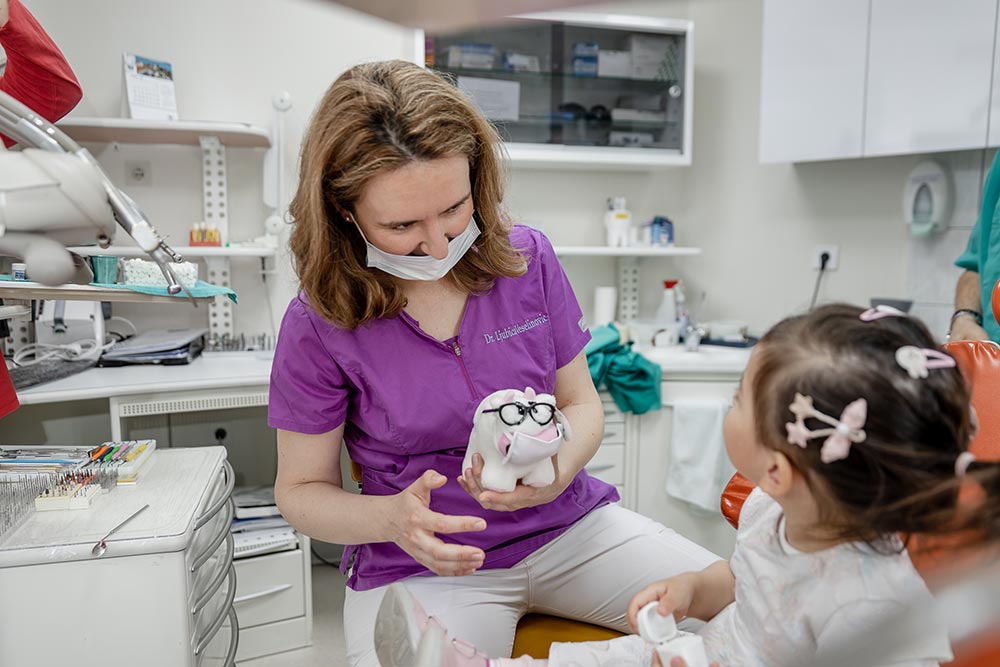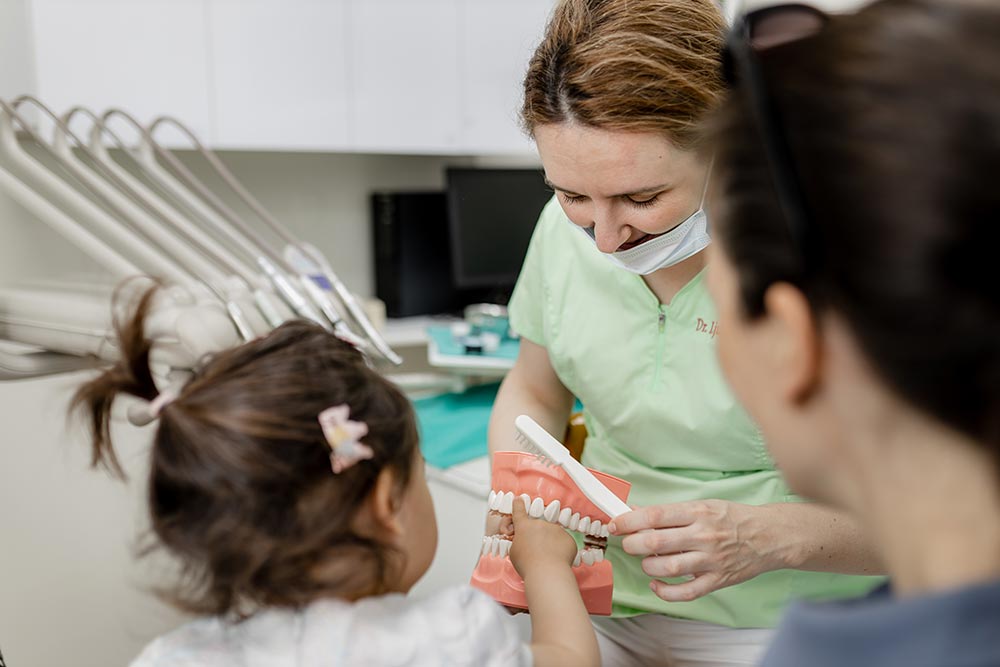Children's and preventive dentistry
Children’s and preventive dentistry is one of the most important dental fields since it deals with the prevention of diseases and disorders of the jaws and teeth.
The goals and tasks of children’s and preventive dentistry are the treatment of children’s teeth and, of course, the promotion of good health habits from an early age.
The subject of pediatric dentistry are:
- protection of milk and permanent teeth of children aged 0–13;
- prevention and rehabilitation of caries;
- elimination of the consequences caused by traumatic dental injuries;
- removal of hereditary anomalies.
Therefore, the comprehensive, primary goal of children’s and preventive dentistry is the establishment and long-term maintenance of oral and dental health.
How children's and preventive dentistry is carried out at the Dr. Veselinović Dental Clinic?
One of the main responsibilities of parents is taking care of their child’s health, and this includes the health of the mouth and teeth.
What children’s dentists advise parents to do is to visit the dentist’s office immediately after the eruption of the first incisors. In most children, the first teeth erupt around the 6th month and that is the moment when an examination should be scheduled.
This initial examination is of crucial importance for the further development of the child’s primary and permanent teeth.
Namely, during the examination,, the children’s dentist will examine in detail the structure and position of the erupted teeth, gums, jaw, oral mucosa, palate, and tongue. If he finds any congenital anomalies, he will refer the parents to a maxillofacial surgeon or other competent specialist.
This examination is also important from an advisory perspective: it will give parents all the guidelines for proper care of their little one’s mouth and teeth.
It is important to enable children to grow up with healthy teeth!

Why is it still important for children to regularly visit the dentist's office from the time their first teeth appear?
If a child visits the dentist for the first time in great pain and swelling due to extensive caries, it is quite certain that the experience will have a traumatic effect on him. The trauma can be so great that he develops a pathological fear of the dentist, which will affect the entire life of an adult.
On the other hand, if the child visits the dentist every 3–
6 months from the beginning of the development of the first teeth (when there are no carious lesions) and develops a friendly relationship with him, this positive image will be reflected in the entire concept of dental care.
Children’s essence is curiosity and warmth, which makes them open to new experiences and acquaintances. Through play and pleasantness, the dentists of our clinic strive to encourage and maintain this natural children’s willingness to cooperate.
After the initial examination, if there is a need for it, a treatment and dental protection plan for the small patient is drawn up.
In the case of school-aged children with improper tooth position, our jaw orthopedic specialists will suggest appropriate orthodontic therapy.
Children's and preventive dentistry: why is the child-parent-dentist alliance important?
What every dentist will emphasize is the personal example of parents. If the parents themselves regularly maintain oral hygiene, eat healthy and regularly visit the dentist, the child will follow them in good habits.
Parents who do nothing about the health of their children’s teeth will very soon encounter the so-called circular caries. And, in that case, the child will suffer the most and suffer the greatest damage.
Our clinical practice shows that a large number of children encounter caries at an early age. Due to the less resistant enamel of milk teeth and inadequate (or no!) oral hygiene, numerous defects are created on the teeth.
Unfortunately, many parents, due to lack of information, do not pay attention to milk dentition and ignore carious lesions. This is a big mistake because baby teeth are extremely important for the growth and development of permanent teeth. Not only do they protect their place, but also their health. Because if the baby teeth are rotten, the bacteria present on the gums are transferred to the new teeth that are sprouting.
Treatment of milk teeth at Dr. Veselinović Dental Clinic
Treatment of baby teeth is extremely important! As already mentioned, they protect the place of permanent teeth and direct their eruption.
Also, they enable the proper function of chewing and speaking (articulation of voices), as well as adequate bony development of the jaws.
Possible inflammation of milk teeth due to untreated caries can be the cause of stains and enamel anomalies of permanent successors.
Dental fluoridation
It is known that caries is one of the most common dental diseases in modern civilization
Today, fluoride is an irreplaceable tool in the prevention of caries and in the remineralization of the initial carious lesion.
It protects the enamel not only of milk teeth, but also of permanent teeth, making it more resistant to the action of pathogenic microorganisms (bacteria). The goal of dental fluoridation is, therefore, longer preservation of healthy dental tissue.

In our dental office, fluoride is most often used in the form of liquid, gel or varnish that is used to coat the teeth. It is specially made for little ones with the taste of strawberry or raspberry.
Filling fissures
Filling fissures (pits) on the occlusal (biting) surfaces of the teeth is a procedure that also belongs to the domain of preventive dentistry.
This method involves coating the given surfaces with special preparations containing fluorine, as well as with certain adhesives.
The goal of filling fissures is to make these depressions shallower in order to prevent the deposition of food residues and the formation of bacterial plaque.
This is the reason why fissure filling is of key importance in the early age of mixed (milk and permanent) dentition, as it significantly prevents caries.
Filling fissures in children is done after the eruption of milk molars. So, somewhere around 6–7 years.
Please note that this is not a permanent method and the tooth is not processed as with fillings. It is usually performed once a year, it should be regularly controlled and, if necessary, repeated.
